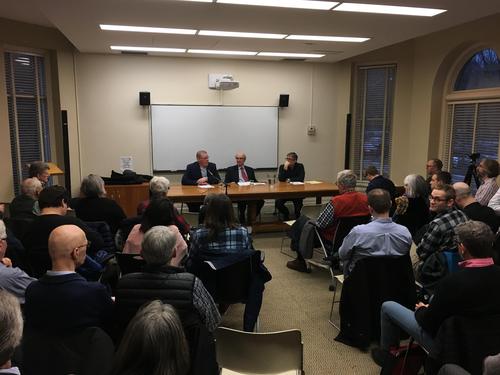 “Our task this evening is to go in pursuit of a mystery and its implications for how we believe and how we live our lives.” It is with these words that Dr. John D. Rempel began his lecture, “An Impossible Task: Trinitarian Theology for a Radical Church?” in front of a packed audience at the Toronto Mennonite Theological Centre on the evening of Thursday, March 14th. In his wide-ranging lecture, Rempel explored Trinitarian thinking from the 4th to the 20th century, noting the consistent challenges brought against it from “un-trinitarian expressions of belief.”
“Our task this evening is to go in pursuit of a mystery and its implications for how we believe and how we live our lives.” It is with these words that Dr. John D. Rempel began his lecture, “An Impossible Task: Trinitarian Theology for a Radical Church?” in front of a packed audience at the Toronto Mennonite Theological Centre on the evening of Thursday, March 14th. In his wide-ranging lecture, Rempel explored Trinitarian thinking from the 4th to the 20th century, noting the consistent challenges brought against it from “un-trinitarian expressions of belief.”
Trinitarian thinking, according to Rempel, represents the church’s primal symbols and constitutes the foundational “grammar” or “first principles” of belief. That Western Christians often approach the gospel apart from such symbols and grammar constitutes a “crisis” in our time, says Rempel, a crisis of “incoherence” in the church’s witness to the God revealed in the Bible. An example of this incoherence, Rempel suggested, is put on display when considering a central ecclesial practice: the eucharist or the Lord’s supper. Un-trinitarian thinking, says Rempel, results in an account of the drama of the Lord’s Supper that ultimately involves only one actor: us.
Part of Rempel’s lecture involved tracing the various sources for and manifestations of this crisis in the classical period and then later in Anabaptist-Mennonite history. Rempel’s most constructive claims, however, were worked out through an account of four 20th century thinkers: John Howard Yoder, Elizabeth Johnson, Jurgen Motlmann, and Jon Sobrino. While all critical of the tradition and thus “unruly Trinitarians,” these four theologians nonetheless remained accountable to trinitarian faith. By doing so, they demonstrate that the doctrine of the Trinity, rather than being a form of antiquated and abstract metaphysics, is a “way of thinking [that] has shown itself able to hold together in a dynamic relationship, the bible’s witness to God’s self-revelation, the creed as its symbol, and its reception across the ages.” Trinitarian grammar, while demanding “accountability,” also “allows for dissent and improvisation.” Just in this way, noted Rempel, Trinitarian thinking is also ecumenical.
More than just a rich historical and theological analysis, Rempel’s lecture was offered equally as admonition. Addressing the next generation, Rempel said:
Take the torch, those of you who are in the generation that is now taking over. Meet us at the center-point of the gospel and then trace out faithful ways of thinking and living that speak out of and into your generation.
Following Rempel’s lecture, Dr. P. Travis Kroeker of McMaster University responded. Approving of Rempel’s appeal to the “eucharistic drama” as a starting point for thinking about the Trinity, Kroeker argued that the Trinity is a “lived economy into the dynamic movement of which we are invited as participants.” Less concerned with questions of coherence, Kroeker suggested that debates about the Trinity come back to the question, implied in Rempel’s analysis: “By which dramas…will we orient and live our lives?” The Trinity, Kroeker argued, is more about the existential drama of Christ’s self-emptying than it is about a “set of rules and concepts for correct understanding” of God.
A robust and appreciative Q&A session followed.
Zac Klassen, TMTC Associate and PhD candidate at McMaster University.




